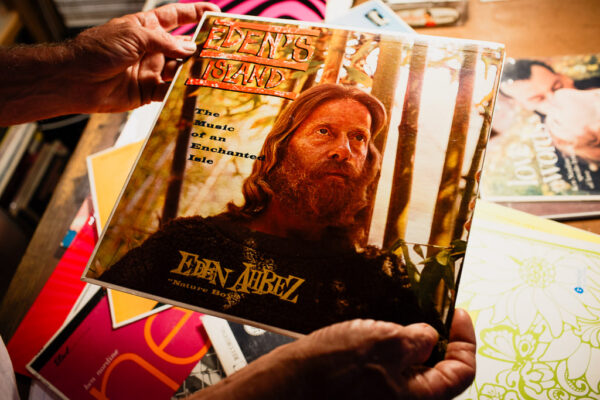Digging Our Own Crates: Eden Ahbez – Eden’s Island

“I hit the road in ’68 with my friends. We drove a VW van down to Mexico, our surfboards strapped to the roof. I didn’t want any possessions at the time. I wanted the sun shining through the trees. Baggage can be good…but at that time I didn’t have any real interest in worldly possessions. I was interested in Eden Ahbez’s record Eden’s Island. Here he was, in perfect health, and one day he walked out of his house and lived in the wilderness, or so the legend goes.” – Mickey McGowen
Eden Ahbez was more than a Nature Boy, although the sentiment rings true. The wide-eyed, Hollywood-sign-sleeping nomad joined The Nature Boys, an early 1900s movement, alongside Robert “Gypsy Boots” Bootzin. The group embraced the mystique of their lifestyle—living off of fruits and vegetables and donning waist-length hair, flowing beards, and a wardrobe of loose robes and sandals. He had a tumultuous life, from living in an orphanage to crossing the entirety of the US on foot at least eight times. Ahbez would later compose “Nature Boy,” famously covered by Nat King Cole.
Ahbez’s allure was hypnotic, and when he released the free-flowing, mind-bending album Eden’s Island in 1960, listeners could fully immerse themselves in his world. Through whirlwinds of hippie-esque exotica, Ahbez lines the record with his own soft-spoken, primitive tones; he intertwines flutes and bongos with sound effects like creaking boats, making the record stand out as an original of its time—no matter how poorly received it was.
Although far from nomadic himself, Dust & Grooves interviewee Mickey McGowan understands the appeal, citing the record as an interest during years of travel and adventure. It’s a wanderer’s quintessential album, and rightfully so. A mesmerizing ode to utopian island paradise, the album’s uniqueness lies not only in its musical brilliance but also in the enigmatic persona of its creator, whose life and art embody the very essence he sought to convey through Eden’s Island.
The experience is between the auditory equivalent of an ocean breeze and walking shoeless in the Hundred Acre Woods. It prompts you to ask yourself if you should eat lunch outside tomorrow, buy more plants, or take long walks around the lonely forest behind your childhood home. Over four decades later, Ahbez remains a testament to the eternal paradise found within the grooves of a record.
Check out our full interview with Mickey McGowen.
Watch our video version of this post on YouTube Shorts.

